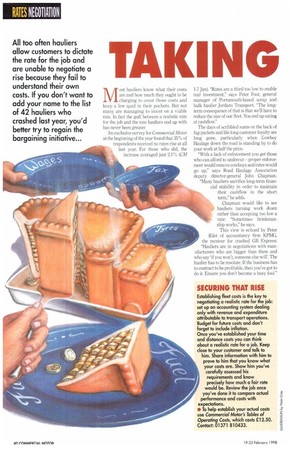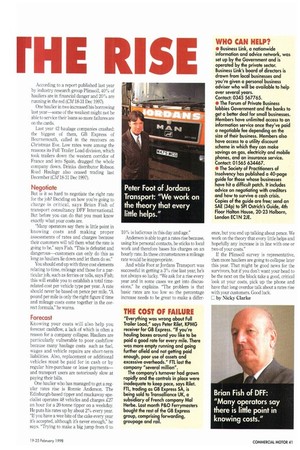TAKING
Page 42

Page 43

If you've noticed an error in this article please click here to report it so we can fix it.
THE RIS
All too often hauliers allow customers to dictate the rate for the job and are unable to negotiate a rise because they fail to understand their own costs. If you don't want to add your name to the list of 42 hauliers who crashed last year, you'd better try to regain the bargaining initiative...
...
ost hauliers know what their costs M are and how much they ought to be
charging to cover those costs and keep a few quid in their pockets. But not many are managing to insist on a viable rate. In fact the gulf between a realistic rate for the job and the rate hauliers end up with has never been greater.
An exclusive survey for Commercial Motor at the beginning of the year found that 35% of respondents received no rates rise at all last year. For those who did, the
increase averaged just 2.1% (CM
1-7 Jan). "Rates are a third too low to enable real investment," says Peter Foot, general manager of Portsmouth-based scrap and bulk haulier Jordans Transport. "The longterm consequence of that is that we'll have to reduce the size of our fleet. You end up eating at cashflow."
The days of scribbled sums on the back of fag packets and life-long customer loyalty are long gone, particularly when Cowboy Haulage down the road is standing by to do your work at half the price.
"With a lack of enforcement you get those who can afford to undercut—proper enforcement would remove cowboys and rates would go up," says Road Haulage Association deputy director-general John Chapman. "Many hauliers sacrifice long-term financial stability in order to maintain their cashflow in the short term," he adds.
Chapman would like to see hauliers turning work down rather than accepting too low a rate: "Sometimes brinkmanship works," he says.
This view is echoed by Peter Rilet of accountancy firm KPMG, the receiver for crashed GB Express: "Hauliers are in negotiations with manufacturers who are bigger than them and who say 'if you won't, someone else will'. The haulier has to be resolute. lithe business has to contract to be profitable, then you've got to do it. Ensure you don't become a busy fool."
SECURING THAT RISE
Establishing fleet costs is the key to negotiating a realistic rate for the job: set up an accounting system dealing only with revenue and expenditure attributable to transport operations. Budget for future costs and don't forget to include inflation.
Once you've established your time and distance costs you can think about a realistic rate for a job. Keep close to your customer and talk to
him. Share information with him to prove to him that you know what your costs are. Show him you've carefully assessed his requirements and know precisely how much a fair rate would be. Review the job once you've done it to compare actual performance and costs with expectations.
To help establish your actual costs use Commercial Motor's Tables of Operating Costs, which costs £12.50. Contact: 01371 810433.
According to a report published last year by industry research group Plimsoll, 40% of hauliers are in financial danger and 20% are running in the red (CM18-31 Dec 1997).
One haulier in two increased his borrowing last year—some of the weakest might not be able to service their loans so more failures are on the cards.
Last year 42 haulage companies crashed: the biggest of them, GB Express of Bournemouth, called in the receivers on Christmas Eve. Low rates were among the reasons its Full Trailer Load division, which took trailers down the western corridor of France and into Spain, dragged the whole company down. Drinks distributor Robson Road Haulage also ceased trading last December (CM18-31 Dec 1997).
Negotiate
But is it so hard to negotiate the right rate for the job? Deciding on how you're going to charge is critical, says Brian Fish of transport consultancy DFF International. But before you can do that you must know exactly what your costs are.
"Many operators say there is little point in knowing costs and making proper assessments of rates and charges because their customers will tell them what the rate is going to be," says Fish. "This is defeatist and dangerous—customers can only do this as long as hauliers lie down and let them do so."
You should end up with three cost elements relating to time, mileage and those for a particular job, such as ferries or tolls, says Fish; this will enable you to establish a total timerelated cost per vehicle type per year. A rate should never be based on pence per mile. "A pound per mile is only the right figure if time and mileage costs come together in the correct formula," he warns.
Forecast
Knowing your costs will also help you forecast cashflow, a lack of which is often a reason for a company collapse. Hauliers are particularly vulnerable to poor cashflow because many haulage costs such as fuel, wages and vehicle repairs are short-term liabilities. Also, replacement or additional vehicles must be paid for in cash or by regular hire-purchase or lease payments.— and transport users are notoriously slow at paying their bills.
One haulier who has managed to get a regular rates rise is Ronnie Anderson. The Edinburgh-based tipper and muckaway specialist operates 48 vehicles and charges £27 an hour for a 20-tonne tipper on a weekday. He puts his rates up by about 2% every year. "If you have a wee bite of the cake every year it's accepted, although it's never enough," he says. "Trying to make a big jump from 0 to 10% is ludicrous in this day and age."
Anderson is able to get a rates rise because, using his personal contacts, he sticks to local work and therefore bases his charges on an hourly rate. In these circumstances a mileage rate would be inappropriate.
And while Foot at Jordans Transport was successful in getting a 3% rise last year, he's not always so lucky "We ask for a rise every year and in some cases we get into discussions," he explains. "The problem is that basic rates are too low so the percentage increase needs to be great to make a differ
ence, but you end up talking about pence. We work on the theory that every little helps and hopefully any increase is in line with one or two of your costs."
If the Plimsoll survey is representative. then more hauliers are going to collapse later this year. That might be good news for the survivors, but if you don't want your head to be the next on the block take a good, critical look at your costs, pick up the phone and have that long overdue talk about a rates rise with your customers. Good luck.
E by Nicky Clarke
WHO CAN HELP?
• Business link, a nationwide information and advice network, was set up by the Government and is operated by the private sector. Business Link's board of directors is drawn from local businesses and you're given a personal business adviser who will be available to help over several years.
Contact: 0345 567765.
The Forum of Private Business lobbies Government and the banks to get a better deal for small businesses. Members have unlimited access to an information service once they've paid a negotiable fee depending on the size of their business. Members also have access to a utility discount scheme in which they can make savings on gas, electricity and mobile phones, and an insurance service. Contact: 01565 634467.
The Society of Practitioners of Insolvency has published a 40-page guide for those whose businesses have hit a difficult patch. It includes advice on negotiating with creditors and how to survive a cash crisis. Copies of the guide are free; send an SAE (34p) to SPI Ostrich's Guide, 4th Floor Halton House, 20-23 Holborn, London EC I N 2JE.
THE COST OF FAILURE
"Everything was wrong about Full Trailer Load," says Peter Rilet, KPMG receiver for GB Express. "If you're hauling boxes around you like to be paid a good rate for every mile. There was more empty running and going further afield and not getting paid enough, poor use of assets and excessive overheads." FTL lost the company "several million".
The company's turnover had grown rapidly and the controls in place were inadequate to keep pace, says Rilet. FTL, trading as GB Express SA, is being sold to Transalliance UK, a subsidiary of French company Mal Herbe. Last month P&O Ferrymasters bought the rest of the GB Express group, comprising forwarding, groupage and rail.




































































































